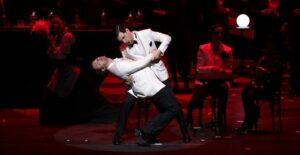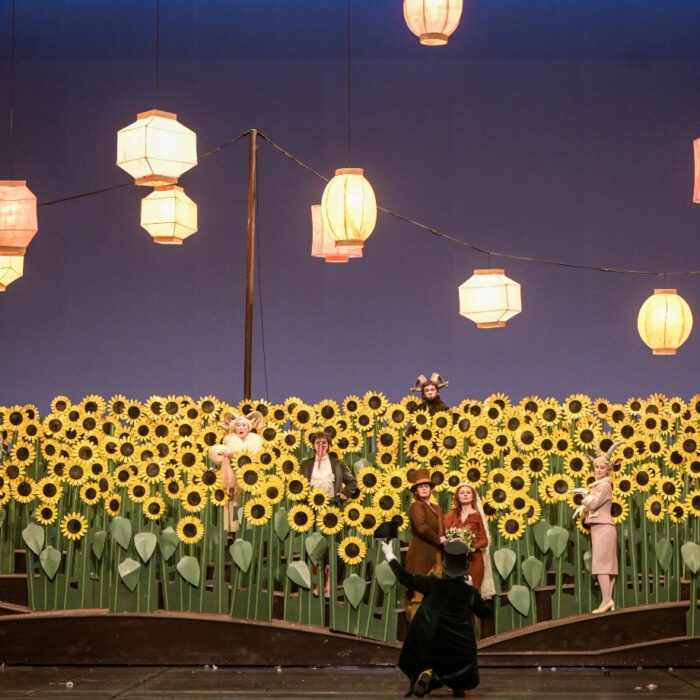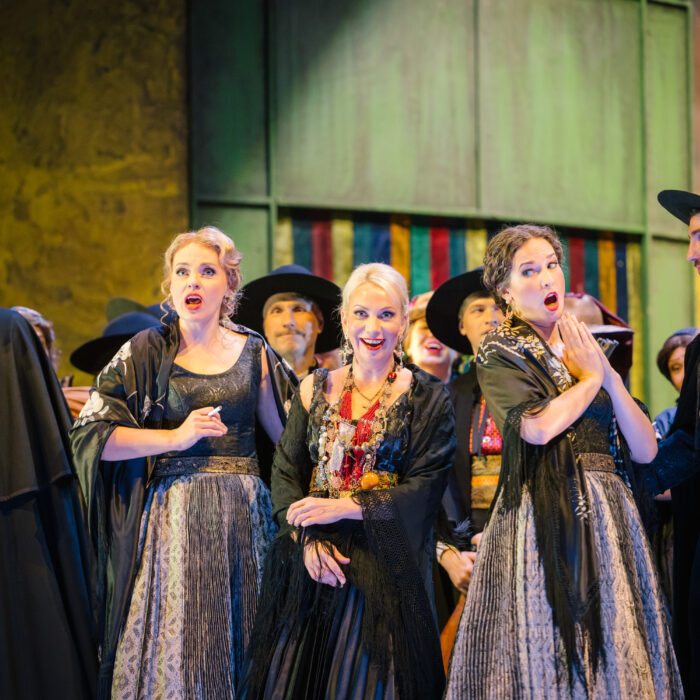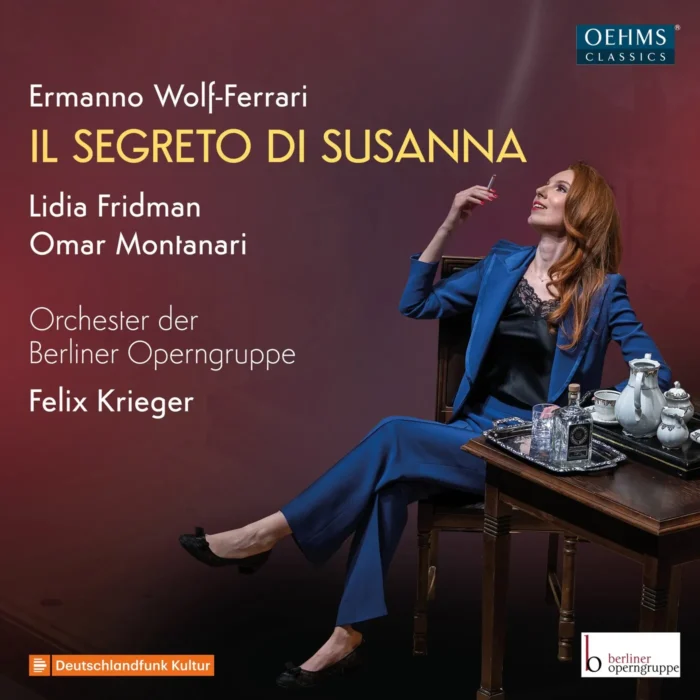
Teatro alla Scala 2022-23 Review: Les Contes d’Hoffmann
Eleonora Buratto, Vittorio Grigolo Shine in Deeply Complex Staging by Davide Livermore
By João Marcos CopertinoThis review is for the performance on March 28, 2023.
Roland Barthes once wrote an essay about “the Death of the Author;” David Livermore’s staging of Jacques Offenbach’s “Les Contes d’Hoffmann” takes that seriously. Hoffmann is shot dead in the first scene. The author dead, does the opera survive?
One of the biggest challenges for a staging “Hoffmann” is how to underline the conflict between the author’s authority over their own creation and the characters’ autonomy, their capacity to be something else beyond the author’s will and melodrama structure. Livermore’s staging in Teatro Alla Scala addresses this issue by making the stage—with its ubiquitous typewriter—more surreal than usual while the characters perpetually attempt to move outside of their designated roles. Hoffmann’s death is a long process in which authorial power is questioned while all the action is, nevertheless, still part of his unconscious creation.
The Protagonist’s Psyche & Desire
Everything in “Hoffmann” is part of the protagonist’s psyche and desire. He longs for Stella, as Nicklausse understands “Ah! je comprends! trois drames dans un drame /Olympia…Antonia… Giulietta …/Ne sont qu’une même femme:/La Stella!” It is all inside his head— even the villainesses.
Livermore understands that quite well: the sets, by Giò Forma, are extremely dark, between the oneiric and the nightmarish, a sordid journey into someone’s unconscious. It works well — but they are not pretty, and sometimes even look poor. What does work in Livermore’s staging, however, is how “Hoffmann’s” characters are always trying to go against the grain of their designated roles. They are trying to escape the autoritas/authority of Hoffmann’s imagination— and of Offenbach’s great music and sense of style.
Olympia, sung by Federica Guida, is a doll fighting her status as doll. Her body is continuously ask to fit eerie plastic molds that she refuses until injections force her to return to that mold—as a doll, as a character. Guida embraces this fight against Hoffmann’s imagination. She does not provide the common laughable gimmicks of waiting to be wound; her Olympia is more lyrical and full of anxiety. Her style of coloratura humanizes her with its refusal to make her voice merely an instrument—her voice is an organic part of her body, not a mechanism separate from her. The interpretation, though impressive, is never fully in tune when it reaches the super-high notes, but the voice carries well in the theater’s acoustics.
The second woman In Hoffmann’s life, Antonia, was sung by the female vocalist who was without doubt the most impressive female vocalist of the night. Eleonora Buratto must sing — even if costs her her life. The soprano’s phrases were the most nuanced of the night; from her first number, “Elle a fuit torturelle,” one can tell why her voice literally makes a candle fly over the stage. Livermore’s staging added a series of very nineteenth-century supernatural phenomena, but they work extremely well only in Antonia’s act. Buratto has that lyric spinto voice that, never compromising its beauty, preserves an inner sense of fragility at the core of its emission. Her voice never sounds constricted, but it has a play of dynamics that cannot adequately be captured by recordings.
The third act, Giulietta’s, arguably has the most famous number of the whole opera: “Belle Nuit, nuit d’amour…” Livermore made the whole orchestra level of the theater represent the Grand Canal in Venice. Although I could not see the effect—I was under the Venetian water—those who were upstairs said it was beautiful. The music, however, was not so great. Francesca di Sauro, Giulietta, though a good singer, sounded a bit off. Her French was not understandable most of the time, and she seemed to rush many of her phrases. Her duo with Marina Viotti’s Nicklausse — more on her later — was less beautiful that it could have been.
The small, but good, participation of Greta Doveri as Stella made her the Doppelgänger of Nicklausse. Albeit interesting, in scenic terms, it promised to say more than it ultimately did.
The transit among the three acts has interesting, but uneven performers—the overall level, however, was high. The characters that appear in all the acts were exquisitely performed.
Interesting Main Trio
Vittorio Grigolo is a particularly satisfying Hoffmann. His stage presence is always effective he embraces the character’s narcissism. His projection is quite good, and his voice sounds more mature and refined than before. Although Grigolo has always had a beautiful voice, it is conspicuously more uniform and controlled now. However, the thing that I enjoyed the most about his Hoffmann was the quality of his enunciation. He hardens French consonantal sounds, making everything exhilarating: the satisfying rhyme of “clic clac” and “Klauznach” must have been audible outside the hall.
Luca Pisaroni worked wonderfully as the ubiquitous villain. The bass-baritone has a tone that expresses everything villainous in the world, and his high notes—though not perfect—were marked improvements on his already good Figaro in Paris Opera last December. His voice has a particularly elastic sonority in the middle range, allowing him to embody each of the many villains while marking details that allowed one to distinguish among them..
The Muse and Nicklausse, performed by Marina Viotti, was something of a riddle to me. The names of few other singers nowadays are so strongly associated with Offenbach’s music as Viotti, and the Italian critics seems to really have enjoyed her performance.
I am, however, less positive.
Although she is clearly capable—she seemed to be way less comfortable in the role than in her Périchole in Théâtre des Champs-Elysées last November. Moreover, her voice carried significantly less well than all the other singers in Scala’s acoustics. She was audible by any measure, but her voice lacked a sense that everyone else’s had of ringing through the walls. Finally, her participation in the Giulietta act was not great. The beginning duo, as noted, was rushed and not phrased enough. Her acclaim perhaps makes my reservations idiosyncratic; but, given the fact that I have enjoyed — very much — Viotti’s voice elsewhere, I wonder if her Nicklausse still has much room for improvement.
All the smaller characters were efficiently sung by Hugo Laporte, François Piolino, Alfonso Antoniozzi, Yann Beuron, Néstor Galván, and Alberto Rota.
A final note must be given to remark on the excellent work of orchestra under the lead of Frédéric Chaslin. It is always an extreme pleasure to hear the good sound of La Scala’s symphony; however, in “Hoffmann” I was particularly impressed by the purity of the brass section’s sound—especially in the third act. They never covered the singer and, still, much of the subtleties and melodic treasures of the opera were audible. The chorus also sings wonderfully.
“Hoffmann” is an extremely complex opera that deals with questions that are essential to literary and musical criticism. Livermore’s staging, though flawed and visually impressive, manages to raise many of them. However, the true spectacle of the night is Offenbach’s music.
Categories
Reviews

